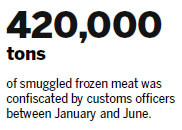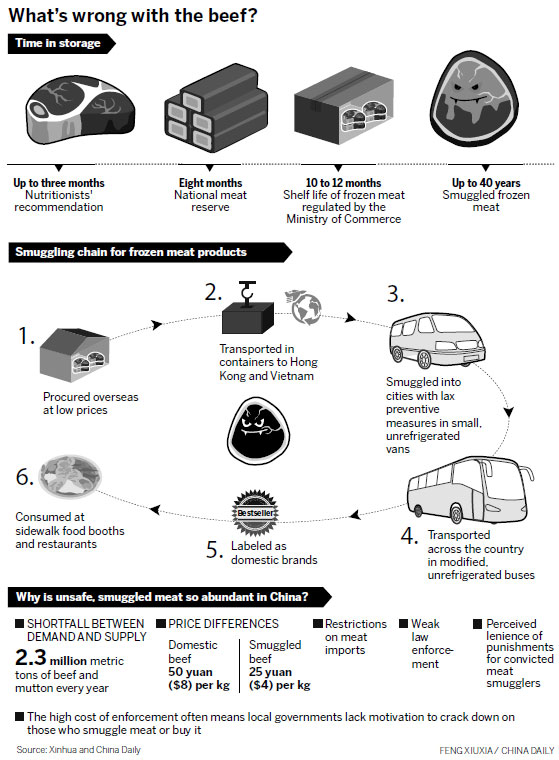Expired products from US, European countries find their way illegally into China's food chain
Meat that had been frozen for up to 40 years old was smuggled into China through a secret supply chain set up by gangs at home and accomplices abroad, according to law enforcement officers.
The criminal network was revealed by customs officials after they busted 14 gangs in 14 provinces and regions in a crackdown on the smuggling of rotten frozen meat products, dubbed "zombie meat" by the media.
The trade in expired meat developed to meet booming demand for meat products.
The General Administration of Customs said officers confiscated more than 100,000 metric tons of smuggled frozen meat valued at 3 billion yuan ($483 million), if sold, including chicken wings, beef and pork.
Some of the seized meat had been kept for as long as 40 years and was sold to customers at sidewalk snack booths and small restaurants in a number of cities.
In Changsha, capital of Hunan province, customs officers broke up two gangs with a total of 20 members on June 1 and seized 800 tons of products that, if sold, would rake in more than 10 million yuan.
Changsha People's Procuratorate issued arrest warrants for the 20 suspects who are alleged to have smuggled and transported the meat.
A prosecutor who is handling the case said gang members colluded with foreign accomplices.
Out-of-date supplies
A senior official at the administration's anti-smuggling department, who declined to give his name, said that most of the smuggled meat comes from abroad, including the United States and some European countries.
"In order to make large profits, suspects in the US colluded with their associates in China, and the gang members assumed different tasks to form a complete and secret supply chain, including offering supplies, smuggling, transportation, storage, manufacturing and sales," he said.
Zhang Tao, a senior official at the anti-smuggling bureau of the Changsha Administration of Customs, said smugglers usually purchase the frozen meat for very low prices in foreign countries, including the US, and send it to Hong Kong in refrigerated containers.
The products are then transported via Vietnam to Chinese border areas in Yunnan province and the Guangxi Zhuang autonomous region where the consignments are divided up and processed before being delivered to restaurants and snack booths, he said.
"The frozen meat is moved under poor conditions, repeatedly thawed or even refrozen after it has already gone bad, which poses a serious threat to people's health," he said.
According to the general administration, some of the confiscated meat is much older than their expiration dates suggest, with some being more than 40 years old.
Gao Guan, deputy secretary-general of the China Meat Association, said many countries freeze and store meat to maintain strategic reserves and keep prices stable.
Practical difficulties
According to a regulation covering China's meat reserve issued in 2007, the country stores frozen pork three times a year and keeps it for four months.
It stores frozen beef and mutton for eight months
"In China, the expiration date for frozen beef or mutton is usually between eight months and a year, compared with an average of two years in other countries," Gao said. "Meat that exceeds the time limit cannot be used."
Yang Bo, deputy director of the Changsha anti-smuggling bureau, said: "We face practical difficulties in testing the actual age of this rotten meat and cannot tell how long it has been stored."
The smuggled frozen meat usually turns up in small cities in provinces such as Yunnan, Guizhou, Sichuan and Hunan, where inspections and supervision are easier to avoid, Yang said.
Li Jun, a beef trader in Beijing, said that the meat could not be sold directly to customers.
"After being frozen for many years, the meat starts to oxidize and turn black.
"Marinating or frying it covers up the rotten taste, and restaurant customers cannot tell bad meat from good meat," Li said.
Buyers choose the meat because it is much cheaper than supplies from legitimate sources. An officer at the Beijing Entry-Exit Inspection and Quarantine Bureau said that, compared with storing frozen meat in a way that meets regulations, the cost of keeping smuggled frozen meat is very low, only 17 yuan per ton each year.
This is because the smuggled meat tends to be kept at higher temperatures than legitimate supplies, so the amount of electricity needed to keep it refrigerated is much less.
The low cost of storage has resulted in rampant smuggling of frozen meat into China, the officer said, adding that if the price of beef is below 25 yuan per kilogram, it is likely to have been smuggled from abroad.
The general administration has been cracking down on frozen meat products since the beginning of the year.
Between January and June, customs departments investigated more than 140 cases involving the smuggling of frozen meat and confiscated 420,000 tons of products, 1.3 times and 2.7 times the corresponding figures for 2014.
During the six-month operation, the customs administrations in Tianjin, Dalian and Shenyang in Liaoning province, Guangzhou in Guangdong province and Hunan province uncovered a number of major cases and detained a large number of suspects.
Customs authorities plan to step up efforts to combat the smuggling. Officers will inspect more mail parcels and intensify the examination of luggage at airports and train stations.
"We will concentrate on identifying criminal gangs and their leaders while enhancing judicial cooperation with other countries to share intelligence," said the official from the general administration's anti-smuggling department.
Border controls

In addition, customs will work closely with other authorities, including immigration inspection and public security departments, to strictly control border areas and block the smuggling of frozen meat, while cooperating with industry and commerce departments and the quality inspection sector to tighten up the supervision of frozen meat products, he added.
"We will conduct a thorough investigation into frozen meat products without legal certificates or that haven't been inspected, and will close down collection and distribution centers used to smuggle the meat."
In addition, a long-term mechanism will be established to improve routine supervision of refrigerated stores and markets that handle frozen meat products.
The China Food and Drug Administration of Supervision said the authorities in Jiangxi, Guangdong, Heilongjiang and Anhui provinces have conducted special operations to check whether meat products sold in markets and restaurants or kept under refrigeration have expired.
"Anyone who sells imported frozen meat products should provide certificates granted by customs," an official said.
"Those without the certificates will be prevented from selling the meat, and the products will be confiscated."
|
Bad meat is dumped at a landfill in Nanning, capital of the Guangxi Zhuang autonomous region, in March. Xinhua |


(China Daily 07/02/2015 page5)
